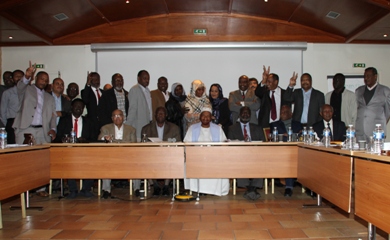Sudanese security arrests opposition figure upon return from Paris
November 15, 2015 (KHARTOUM) – Sudan’s opposition alliance National Consensus Forces (NCF) Sunday said the security agents at Khartoum airport has detained one of its leaders upon his return from Paris where he attended opposition meeting.

He added that NISS seized Ismail’s passport and forced him to sign a pledge to report to its office after a week.
Youssef noted that NISS had previously seized passports of five opposition leaders including the secretary general of the Sudanese Communist Party (SCP) Mohamed Mukhtar al-Khatib, SCP leading figures Siddiq Youssef and Tarig Abdel-Mageed, chairman of the Sudanese Congress Party (SCP) Ibrahim al-Shiekh and chairman of the Unified National Unionist Party (UNUP) Galaa al-Azhari, saying the passports are still in NISS position.
Last week, NISS banned al-Khatib, Youssef, Abdel-Mageed and al-Azahari from travelling to Paris to attend the opposition meeting.
He expected that NISS would also detain the rest of the opposition leaders upon their return from Paris, saying the move is inconsistent with the laws and the constitution as well as the national dialogue climate.
“We believe this move doesn’t help the ongoing national dialogue or the [security arrangement talks] which would convene within hours”. Youssef said.
“We urge the regime to look at Paris meeting differently if it is serious about [holding] the national dialogue,” he added.
It noteworthy that the opposition “Sudan Call” forces including the NCF, National Umma Party (NUP), rebel umbrella Sudan Revolutionary Forces (SRF) and the Civil Society Initiative (CSI) held a four-day meeting outside Paris to discuss issues of regime change as well as organizational issues pertaining to the alliance.
They decided to “liquidate” the regime and establish a transitional national government either through dialogue or popular uprising.
(ST)
